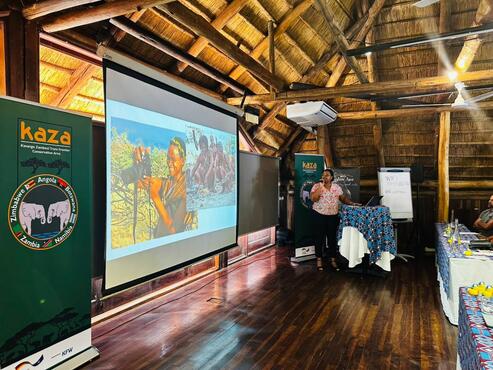Energy Efficiency Network Launched for the Tourism Sector in Botswana and Namibia

From 31 May to 6 June, twelve tourism companies in Botswana and Namibia came together to launch the first Energy Efficiency Learning Network to reduce energy consumption and CO2 emissions in the Kavango Zambezi (KAZA) region. The initiative is supported by the KAZA Secretariat, the Botswana Tourism Organisation, the Namibia Tourism Organisation and the German Federal Ministry for Economic Cooperation and Development (BMZ).
Taboka Motlhabane, Renewable Energy Technical Advisor supporting the GIZ Learning Eenergy Efficiency Network (LEEN) project, highlighted the importance of the tourism sector taking a proactive approach in adopting technologies, practices and tools to achieve significant emission reductions and stimulate economic growth and innovation in the region.
Simone Micheletti, owner of Serondela Lodge in the Chobe area of Namibia, emphasised the responsibility of businesses in the KAZA region to protect its remarkable nature and wildlife. Climate change is a result of unsustainable energy and land use practices, and the tourism sector has a role to play in mitigating its effects.
Over the next two years, participating companies will receive expert support and carry out energy audits. They will set savings targets and work together to implement profitable energy-saving measures. The LEEN concept has already proven successful in Germany, where more than 350 networks with over 4,000 participating companies are currently in operation. The aim is to create a supportive network where businesses can learn from each other's successes and promote sustainable practices in the tourism sector.
Johan Bruwer, General Manager of Chobe Game Lodge, spoke of their early initiatives, such as electric offroad vehicles and boats, and a comprehensive environmental management plan to minimise their footprint in the pristine natural environment of Chobe National Park. He emphasised the value of learning from peers in a network and sharing successes to pave the way for a promising future in sustainable tourism.
The launch of LEEN for the tourism sector in Botswana and Namibia represents a collective commitment to combating climate change and promoting sustainable practices within the industry. By working together, the project aims to make a significant contribution to reducing energy consumption and improving environmental conservation in the KAZA region.